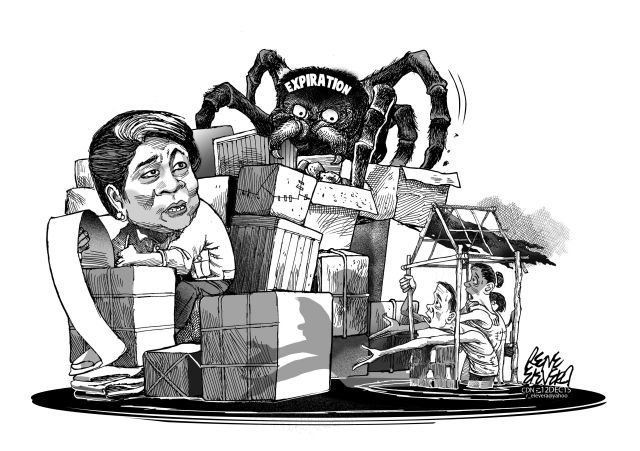
Social Welfare Secretary Dinky Soliman’s admission last Dec. 3 that there were sacks of relief goods that were dumped in a pit in Dagami town, Leyte province is yet another reminder of how government bureaucracy and red tape can waste millions of pesos worth of donations to victims with little remorse from those tasked to ensure its delivery.
The timing of Soliman’s admission was ironic in a season of gift-giving and generosity, when it is said that it is better to give than to receive.
The discovery of the pit containing thousands of donated goods that were dumped after they were found rotting inside the DSWD’s warehouses gave cause for candidates like Vice President Jejomar Binay and vice-presidential candidate and Sen. Bongbong Marcos to rail against the administration for its criminal neglect in disposing not only government funds but donations that were given by both domestic and foreign groups and persons.
This isn’t an isolated incident.
In September last year, the Commission on Audit (COA) reported that P2.7-million worth of donated canned goods and rice that were transported from Cebu City to Isabel town in Leyte province got spoiled after being soaked in rain.
At the time, Soliman said the spoiled goods represented only a very small percentage of the total volume of donated goods that were delivered by the national government to victims of supertyphoon Yolanda.
But her admission of the dumping pit for rotten spoiled donated goods last Thursday only disproved her contention that the DSWD’s relief operations were efficient and above par.
It’s easy to blame government, supporters of this administration would insist, while not looking at the total picture of how they managed to help rebuild the communities that were ravaged by the supertyphoon in 2013.
Still, one cannot simply turn a blind eye to Soliman’s admission coming as it did belatedly or more than a year after refuting charges of gross inefficiency not just from the administration’s critics but from the victims of the supertyphoon who howled for days over government failure to deliver aid to them.
That government’s red tape and inefficiency can be seen in the many restrictions imposed on the processing of donations coming from other countries by the Bureau of Customs at the height of the Yolanda tragedy.
Soliman’s admission sends a warning and a message, wrong and damaging though it may be to government and Filipinos alike, to both domestic and foreign donors who don’t think twice about helping strangers who lost both home and family to Nature’s wrath: Send your donations at your own risk.